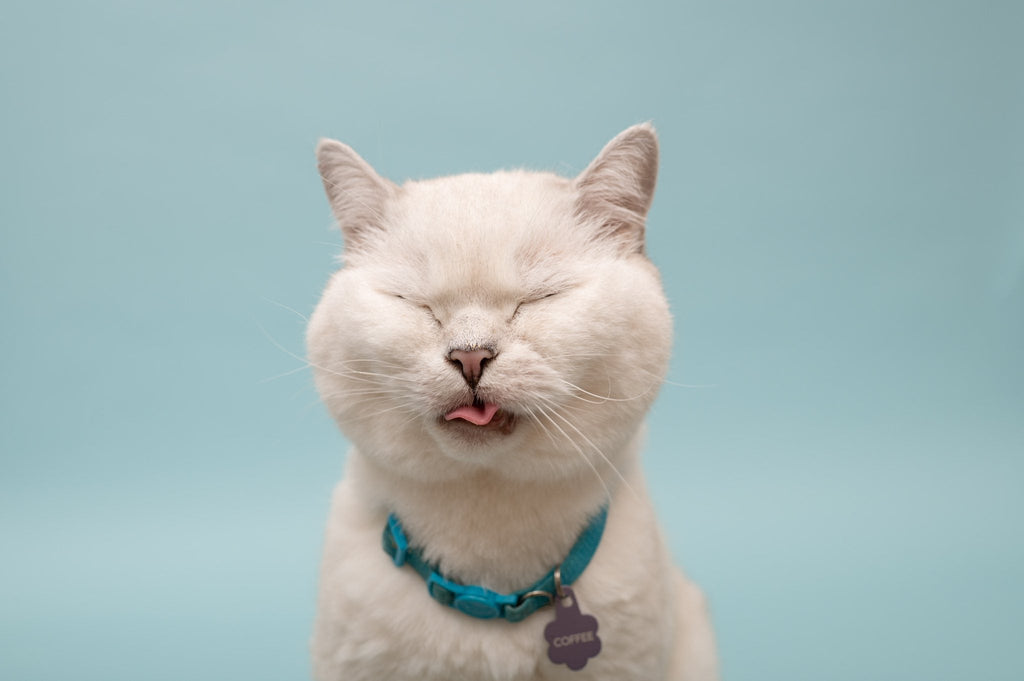When cats don’t feel well, they tend to hide their symptoms, which can make it difficult for their owners to get them the help they need.
Here are some signs that your cat may not be feeling well.
Bad Breath
If your cat is having dental issues, their breath might smell pretty bad. Rotten teeth, gingivitis, and stomatitis can lead to bad breath. Eating, especially dry kibble, might be painful for your cat if their teeth are bothering them so make sure they see a vet for a dental exam as soon as possible.
Behavioral Changes
Lethargy or seeming a little “blah” can be symptoms of many illnesses. They might not be lifting their heads up or carrying their tails up high. A classic sign of a cat who doesn’t feel well is a cat who is hunched over in a loaf position looking small and shrunken. They could be sleeping more or eating less than usual. Cats are creatures of habit so when there’s a change in their routine or their behavior, take notice.
Changes in Grooming Habits
If your cat is looking a little unkempt they likely aren’t grooming because they don’t feel well. Their fur can appear more oily, greasy, or even matted if they aren’t properly cleaning. Conversely, a cat suffering from allergies or stress may be over-grooming and could have bald spots or red patches on their skin.
Dehydration
If you pull up a bit of your cat’s scruff and let go and it goes down slowly, that’s a sign your cat is dehydrated. Hydrated skin will snap back down in a second or two while dehydrated skin will slump down more slowly. A dehydrated cat likely feels too unwell to eat or drink.
Increased Thirst
If your cat starts drinking a lot more water than usual, they may be suffering from kidney disease, diabetes or thyroid issues. Cats generally don’t drink that much water - typically getting hydration through their food - so when they increase their water intake, something is likely ailing them.
Litter Box Changes
If your cat stops using the litter box and is urinating elsewhere, they might have a medical issue like a urinary tract infection or a behavioral issue due to stress or anxiety. They should see a vet to rule out any bladder, kidney, or urinary issues.
If your cat is defecating more or less than usual or there are changes in its consistency, they likely are suffering from a medical issue or parasite that requires gastrointestinal medication.
Respiratory Issues
Cats have a third eyelid near the inner corners of their eye. Sometimes if they are sleepy, you will notice it. Otherwise, you likely won’t notice it unless they aren’t feeling well. A sick cat’s third eyelid stays out most if not all of the time.
Discharge from the eyes and nose as well as coughing, sneezing, or labored breathing can be signs of an upper respiratory infection. A few days of medicine, rest, and TLC should have them feeling better.
Vomiting
It’s normal for cats to throw up after eating or vomit a hairball once in a while, but if your cat is vomiting often and for multiple days they may have an underlying issue. Monitor how often your cat is vomiting and when.
Vocalization
If your cat is crying or meowing more than usual, they may be trying to tell you that something is wrong. If they’re whimpering, whining, or yowling, they are likely in pain and need your help.
Weight Loss
When cats don’t feel well, they don’t eat. Skipping meals, only eating treats, or refusing to eat anything, are all signs that a cat doesn’t feel well.
Here is some general advice on how to care for a sick cat until they’re feeling better.
Schedule a Vet Visit
The first and most important step is to take your cat to the vet. Your vet will be able to provide a diagnosis and give you medication and a treatment plan tailored to your cat’s specific needs.
Monitor Symptoms
After the initial exam, monitor your cat’s symptoms closely, and if they worsen or new symptoms develop, contact your vet as the treatment plan may need some modifications.
Create a Calm and Cozy Environment
Sick cats need calm, quiet places to rest. Cats also like to hide when they aren’t feeling well. Set up a cozy nook with a pet bed or some soft, warm blankets where they can relax and hunker down. Consider adding a heating pad underneath a blanket to keep them extra cozy. Hang out with them, even if it’s just being in the same general area. Your presence will comfort them and give them some reassurance when they’re feeling vulnerable.
Keep Them Hydrated
Even though a sick cat may not want to eat or drink, it’s important to keep them hydrated so they don’t decline any further. Small, frequent meals of extra-stinky food could lure them into eating a few bites and cool, fresh water should always be available nearby. A few licks of a mousse treat helps with both hydration and nutrition. Even if they aren’t willing to eat much, a few calories are better than none.
Conclusion
While caring for a sick cat is stressful, with proper attention and care, your furry friend can recover and return to their happy, healthy self. Getting them to the vet, monitoring their symptoms, and providing them with medication and TLC in a calm and quiet space will have them on the road to recovery in no time.
Love, Nala




















